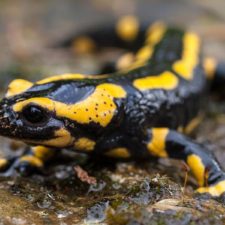Salamanders exist in a variety of breeds that vary in shape, size, color, and natural habitats. Just like with humans, correct nutrition and a balanced diet are key to the health and well-being of your pet. And like most all reptiles, salamanders are carnivores. Knowing what and what not to feed him can help ensure your little buddy has a long, healthy life. In this post, a veterinarian lists a few salamander diet dos and don’ts.
Salamander Diet Dos
Dietary Needs
As reptiles, salamanders should be fed a carnivorous diet that consists of foods they would eat in their natural habitat, which includes land and water environments. If your pet is a land-dweller, insects, mealworms, crickets, tubifex worms, and white worms should make up the bulk of his diet. For water-dwellers, you’ll need to feed him water-borne critters, like bloodworms, nightcrawlers, and brine shrimp.
Commercial Food Options
Commercial food options or pellets are another way to go since they contain processed versions of insects and worms. However, processed pellets shouldn’t be the main part of your salamander’s diet. Reptiles are natural-born hunters, meaning they need to hunt for their food. Also, some captive breeds will refuse to eat pellets for that very reason. Another option to consider is feeding your salamander freeze-dried insects instead of live ones.
Salamander Diet Don’ts
Feeding Schedule
One common misconception about feeding salamanders, and amphibians in general, is that they should be fed daily. Actually, adult salamanders only need to be fed two or three times a week at nighttime. It’s rather the juvenile or younger salamanders that require daily feedings. And always have clean, fresh, chlorine-free water available for your little friend.
Fruits and Vegetables?
Your salamander’s digestive tract can’t really process anything other than meat, so you shouldn’t be feeding him fruits or vegetables. Since your pet does still need some fruit and vegetable-based nutrients, you’ll want to be sure the insects you feed him have been fed lots of these types of foods.
Supplements?
Unlike humans, most reptiles don’t need vitamins and supplements in their diets. However, your little salamander buddy will need calcium powder supplements for bone health. Also, make sure the calcium powder you use doesn’t include vitamin D3 since this can be toxic to reptiles.
If you have more questions or wish to schedule your salamander for a checkup, don’t hesitate to call your local vet today!






